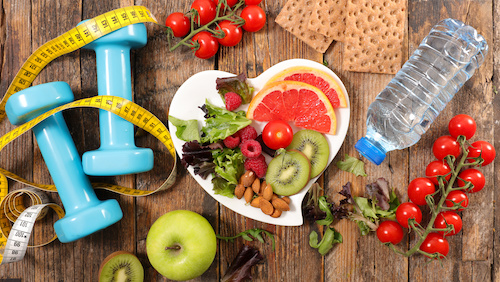
New Brunswick, N.J., July 1, 2022 – This year, there will be an estimated 1.9 million new cancer cases and more than 609-thousand deaths in the United States. According to the World Health Organization, between 30 and 50 percent of all cancer cases are preventable. July is Health Promoting Lifestyles for Cancer Prevention Month, and while you can’t change risk factors such as age or genetics, other risk factors for cancer including healthy lifestyle choices are within your control. Evelyn Fuertes, BA, NDTR, community outreach coordinator and member of the Cancer Health Equity Center of Excellence at Rutgers Cancer Institute of New Jersey, the state’s only National Cancer Institute (NCI)-Designated Comprehensive Cancer Center, together with RWJBarnabas Health, works to educate communities and providers in cancer prevention. She shares more on the topic.
Eat healthy, get moving and eliminate alcohol consumption. Eating a well-balanced diet, exercising on a regular basis and maintaining a healthy body weight have many health benefits. All three factors can reduce cancer risk and have been linked to better overall health and better cancer outcomes. American Cancer Society Guideline for Diet and Physical Activity for Cancer Prevention suggests adopting a lifestyle pattern that includes eating a diet of whole grains, vegetables, fruit, and beans; minimizing red and processed meat, fast foods and other processed foods high in fat, and sugars; and prioritizing physical activity to maintain a healthy body weight. Additionally, alcohol consumption is not recommended, as it is a carcinogen and has been found to increase risk for many cancers.
Protect your skin from the ultraviolet (UV) rays. Exposure to UV rays can increase the risk of developing sun-related skin cancer. The Centers for Disease Control and Prevention (CDC) suggests covering up with long sleeves, pants and a wide-brimmed hat along with applying sunscreen (SPF of at least 30) 30 minutes prior to sun exposure and reapplying every two hours. Additionally, avoid artificial sources of UV exposure like tanning beds and sunlamps.
Stop smoking. According to the National Cancer Institute (NCI), tobacco can increase the risk for many kinds of cancer including lung, mouth, throat, cervical, blood, bladder, esophagus, stomach, pancreatic and kidney cancers. In fact, according to the NCI, cigarette smoking causes about 25 percent of all cancer diagnoses and 30 percent of all cancer deaths in the United States. Avoiding tobacco products and quitting smoking are major steps that can be taken to lower the risk for developing cancer. Please contact the Tobacco Dependence Program if you or a loved one is interested in quitting: 732-235-8222 or visit www.tobaccoprogram.org
Make cancer screening part of your lifestyle. Preventative screening tests can lead to early detection of cancers, some of which, if discovered early, can be successfully treated. Resources available through Rutgers Cancer Institute of New Jersey and ScreenNJ describe risk factors and other information that can be useful in speaking to a health care provider about a screening schedule. For more information, visit our Cancer Prevention Resource Center.
###
For journalists – contact:
Krista Didzbalis
Media Relations Assistant
732-507-8307
krista.didzbalis@rutgers.edu

